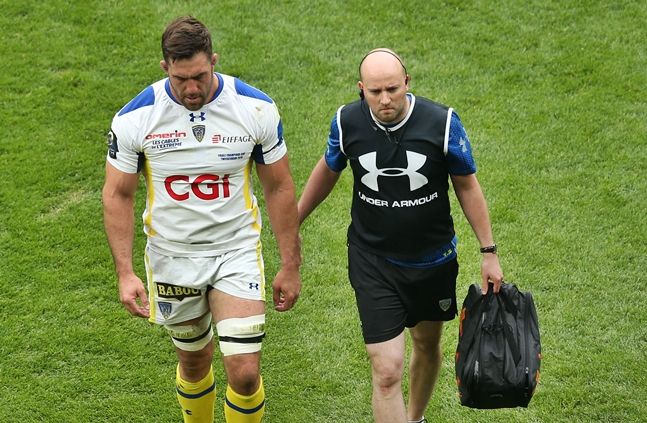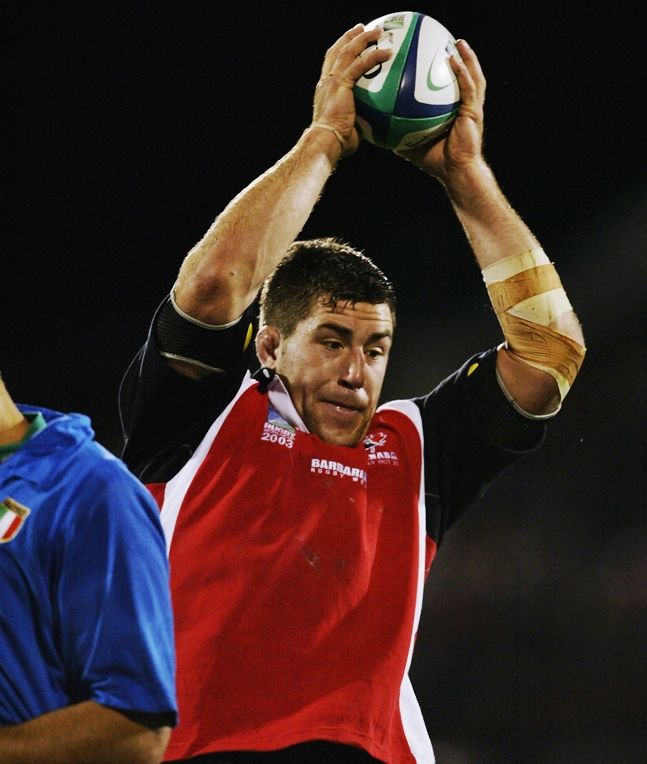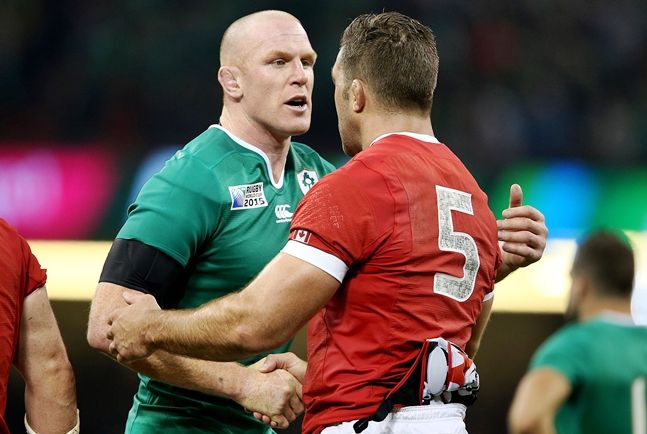

Share
16th September 2018
03:56pm BST

 It was not the first time he had been "sparked" but it was the one that pushed him over the edge.
Something wasn't right.
***
Skiing was Cudmore's first sporting love. He grew up in Squamish, British Columbia and was up on, and down, on skis from an early age. Whistler was nearby and Cudmore, his family and friends, made the short trip up on a regular basis.
It was not the first time he had been "sparked" but it was the one that pushed him over the edge.
Something wasn't right.
***
Skiing was Cudmore's first sporting love. He grew up in Squamish, British Columbia and was up on, and down, on skis from an early age. Whistler was nearby and Cudmore, his family and friends, made the short trip up on a regular basis.
"I got up to the British Columbia and Junior Canada teams but I always wanted to play rugby. My dad is English. He emigrated to Canada in the 1970s and he always talked about rugby; about that sense of team spirit. He always wanted his boys to play rugby but there wasn't the opportunity. "I was working in the bush - logging - at around 16 and my boss was the president of a local rugby club that he had just created that year. "He said to me and my mate Dave, 'Look, if you don't want to work on Saturdays, come down and play rugby with us'. Dave asked me about and I told him all about my dad playing it - 'It's a bit of rough and tumble, you get to have a beer after it and it sounds like a good time'."That was it, says Cudmore. His friend continued on in the bush while Cudmore was hooked. He was a rugby player. That was the goal, at least. He played with Capilano Rugby for a year before selling his worldly possessions to buy himself air-fare to New Zealand. He played club rugby in Auckland's North Harbour and did some coaching to further hone his craft. There was another year in a Canadian development selection - the country's best and brightest hopes - before he headed to Europe.
 By 2002/03 and his signing for Llanelli, Cudmore had made his senior Canadian debut. "It started snowballing from there," he says. "I had a good year playing for Llanelli and Llandovery. The following year I played with Canada in the World Cup, in Australia."
A move to Grenoble followed and his solid form led to Clermont Auvergne swooping for him. He was 26 and playing for a Top 14 giant. He finished league runner-up with Clermont in 2007, 2008 and 2009 but they kept plugging away. The mountain was climbed, and the Bouclier de Brennus clinched, in 2010.
Having battled his way to legendary status at the club, it was a real shame that Cudmore left Clermont with some sour memories.
Cudmore is set to take legal action against Clermont after sustaining those two concussions in such a short period of time. "You know if it is happening at a professional level then you know it is happening at club level and lower levels," he says.
One of the positives to come from the sorry situation is that Cudmore has thrown himself into the PlaySmart campaign, which 'looks to take the mystery out of what is involved with concussion' and looks set to be adopted by World Rugby in the coming months.
https://youtu.be/Pxu33y5KgP8
"The biggest thing for me, personally," he says, "is hearing stuff from other players who have suffered similar situations as myself - where they have been allowed to continue to play where they are clearly in a concussed state.
"That has got to stop because rugby players never say no. They always want to play. That's not the problem. The problem is when the doctors or team managers, in the heat of the moment, want their best players on the field. What they've got to realise is when their best player is concussed, he is obviously not in his best state, he needs to be taken off the field and protected. A lot of work still needs to be done here in France and the best way to do that is through education."
Paul O'Connell recounts the story of his concussion on his Ireland debut, in 2002, in his autobiography The Battle. He was concussed early on in a Six Nations game against Wales but managed to play on until half-time and even get over for a try that he certainly cannot remember. Cudmore says:
By 2002/03 and his signing for Llanelli, Cudmore had made his senior Canadian debut. "It started snowballing from there," he says. "I had a good year playing for Llanelli and Llandovery. The following year I played with Canada in the World Cup, in Australia."
A move to Grenoble followed and his solid form led to Clermont Auvergne swooping for him. He was 26 and playing for a Top 14 giant. He finished league runner-up with Clermont in 2007, 2008 and 2009 but they kept plugging away. The mountain was climbed, and the Bouclier de Brennus clinched, in 2010.
Having battled his way to legendary status at the club, it was a real shame that Cudmore left Clermont with some sour memories.
Cudmore is set to take legal action against Clermont after sustaining those two concussions in such a short period of time. "You know if it is happening at a professional level then you know it is happening at club level and lower levels," he says.
One of the positives to come from the sorry situation is that Cudmore has thrown himself into the PlaySmart campaign, which 'looks to take the mystery out of what is involved with concussion' and looks set to be adopted by World Rugby in the coming months.
https://youtu.be/Pxu33y5KgP8
"The biggest thing for me, personally," he says, "is hearing stuff from other players who have suffered similar situations as myself - where they have been allowed to continue to play where they are clearly in a concussed state.
"That has got to stop because rugby players never say no. They always want to play. That's not the problem. The problem is when the doctors or team managers, in the heat of the moment, want their best players on the field. What they've got to realise is when their best player is concussed, he is obviously not in his best state, he needs to be taken off the field and protected. A lot of work still needs to be done here in France and the best way to do that is through education."
Paul O'Connell recounts the story of his concussion on his Ireland debut, in 2002, in his autobiography The Battle. He was concussed early on in a Six Nations game against Wales but managed to play on until half-time and even get over for a try that he certainly cannot remember. Cudmore says:
"There are scary stories like that everywhere. I've got plenty myself. I've heard hundreds from guys in every walk of life, even Masters rugby and kids rugby. "I reckon Paul was like me. He didn't know the dangers of it. He just didn't know. You get knocks on the field all the time and you play through it because that's part and parcel of being a rugby player. It's definitely going to come to a point where, you know, it's like twisting your knee and nobody wants to take the risk [of you playing on]... "It's definitely more important when you have a concussion because not only can you have serious, serious symptoms after the fact, you could also be dead. Getting a second impact very close after a first impact can kill you. Nobody needs to die playing sport."According to the research he has thrown himself into and the experts he has spoken to, there is no clear definition for a big or small concussion. They are all head injuries. "I can easily say, going through all my career, I've had double digit... I don't know whether you can say concussions, whether it would be head injuries or small little sparks but from the research I have seen, each one counts," he says.
 Education is the key factor in changing perceptions but Cudmore has an immediate suggestion that he feels would ease that pressure on players, medics and coaches.
Education is the key factor in changing perceptions but Cudmore has an immediate suggestion that he feels would ease that pressure on players, medics and coaches.
"Rugby is a contact sport, so you can't take the contact out of it. "You can work a lot on tackle technique and on neck strength. I think World Rugby can try and change something around the rules but, for example, tackles to the chest often end up hitting the ball and going up. It's a case-by-case basis but the referees are in a tough situation... A low tackle can be dangerous as well - you chop somebody in the ankles and they fall to the ground; that can cause a concussion too. "The biggest thing for me, in terms of players, is working on technique. Make sure you get that shoulder in and your head on the right side. Neck strength is one of the biggest things to slow down impact. "In terms of changing the rules of the game, the big one they need to do is getting more players on the bench. It takes away that pressure that if a good player is injured or concussed, that they stay on because there is no-one as good or better to replace them."The game has progressed massively over the last 15 years - Cudmore is eye-witness to it all - but the rule changes have been too few and futile for his liking. "We've got to get a bench with 10 players on it. Maybe 12," he says. Cudmore hung up his boots in May 2017 but knows he will carry with him the experiences, and knocks, of rugby for years and years to come. Rough and tumble, and a few beers. He'd change a few things but he wouldn't change most of it. *Updated from piece first published in November 2016
Explore more on these topics: